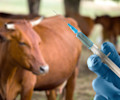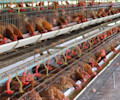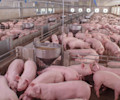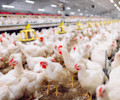(20 March 2017, New York). A new investor report, launched today, profiles how fast food giants such as McDonald’s Corporation and Yum! Brands are responding to a $2 trillion investor coalition call to reduce the overuse of medically important antibiotics by large meat and poultry producers. The report also reveals new research underscoring the link between the use of antibiotics in livestock and the rise of antibiotic resistant bacteria in humans.
The rise of antibiotic resistance has been described by WHO as, “one of the biggest threats to global health today”, exposing institutional investors to significant material risks. Inappropriate use of antibiotics in livestock is seen as a key factor in better prevention and the $2 trillion investor coalition including Aviva Investors, Aegon Asset Management, Natixis Asset Management and Coller Capital engaged a $170 billion group of ten large restaurant companies in March 2016 to end the routine overuse use of medically important antibiotics. The coalition was brought together by the FAIRR Initiative and ShareAction. Responses show:
70% of companies have now adopted either a comprehensive or partial policy to prohibit use in poultry, up from 50% in March 2016.
80% of companies report they are now actively engaging with suppliers to monitor antibiotic usage. Yum! Brands however was the only company that ignored a request for further information.
None of the companies surveyed have developed fully comprehensive, publicly available antibiotics policies to cover their entire livestock supply chain.
Richard Keery, Investment Manager, Strathclyde Pension Fund said,
“There is a growing public focus on rising levels of antibiotic resistance and the risks it poses to public health systems and ultimately to portfolio value. Antibiotic resistance is gaining traction as an important investment risk factor and the investor engagement is to be commended for ensuring this message is heard loud and clear in the restaurant sector. The pension funds and asset managers in the investor coalition will be watching closely to see what further reductions in antibiotic use can be made in this sector and beyond.”
The report, ”˜The restaurant sector and antibiotic risk’, cites changing regulation — including potential new EU legislation which would ban routine preventative use of antibiotics on farms, already voted through the European Parliament, and 2017 US Food and Drug Administration (FDA) guidance on antibiotic use — as a key financial risk for companies failing to improve practices.
The report also highlights new analysis from a Cambridge University-backed study reinforcing scientific opinion that antibiotic resistant bacteria, such as some strains of E. coli, can spread from livestock to humans via food consumption.
Jeremy Coller, Founder of the FAIRR Initiative and CIO of Coller Capital, said:
“Investors are not immune to antibiotic resistance. It’s hard to put a monetary cost on antibiotics becoming useless, but some estimate it could lose $100 trillion from global economic output, creating an enormous global financial and public health crisis. New regulation, shifting consumer preferences and trade restrictions are already driving a reduction in antibiotic use in livestock. The clear message to these companies is that their shareholders want to see meaningful action on antibiotics.
“The last year has seen encouraging commitments to reduce antibiotic use in poultry, but there are still dangerous levels of antibiotics administered to pigs, cattle and other livestock. Fast food chains must take action across the entire animal supply chain.”
Since its launch in March 2016, the investor group backing this engagement has grown to 71 institutions representing more than $2 trillion in assets under management.
Natalie Beinisch, Engagement Manager, Aegon Asset Management,
“To protect against threats to the financial health of our clients, we also need to care about physical threats to public health. That is why Aegon takes a proactive approach to the management of health-related risks. Antibiotic resistance is one of the most serious emerging global health risks and to help defend against such an enormous threat we are encouraging fast food chains to reduce the non-therapeutic use of antibiotics important to human health in their global meat and poultry supply chains. FAIRR is rightly urging the restaurant sector to take action to counter this trend.”
Catherine Howarth, Chief Executive at ShareAction, said:
“The FAIRR/ShareAction investor coalition on antibiotics has grown by more than one third since this engagement began. Clearly, these major investors recognise that antimicrobial resistance is a threat to markets and to healthy workforces. Consumers are also paying more attention to what’s in their food. The combined force of investor and consumer concern means restaurant and food companies run substantial risks if they don’t set targets to phase out routine use of antibiotics in their supply chains.”
The investor engagement is ongoing with a third phase of correspondence sent in March 2017.
**ENDS<br />**
Notes to editors
For more information or for exclusive interviews with the FAIRR team, please contact:
Caroline Barraclough, ESG Communications,<br />t: + 44 (0)7503 771694 | e: carolineb@esgcomms.com
Full copies of the report available at: fairr.org
The ten companies written to by investors are: Brinker International; Darden Restaurants; Domino’s Pizza Group; J.D. Wetherspoon; McDonald’s Corporation; Mitchells & Butlers; Restaurant Brands International; The Restaurant Group; The Wendy’s Company; and Yum! Brands. Now on the third phase of engagement, the latest letters were sent to companies on 10 March 2017. *Total market cap of $173 billion
The coalition has been brought together by the FAIRR Initiative and ShareAction, with the support of US investor group ICCR and US non-profit As You Sow. The launch of today’s progress report was held at an investor event in Midtown, New York.
Investors signing the letters include: Aegon Asset Management, Aviva Investors, Natixis Asset Management,
Candriam Investors Group, ACTIAM, Handelsbanken Asset Management, Raiffeisen Capital Management
Hermes Investment Management, Strathclyde Pension Fund, Coller Capital, Calvert Research and Management, Dignity Health, Martin Currie Investment Ltd, Dana Investment Advisors, Mirova, Impax AM, Pax World, Trinity Health,Walden Asset Management, Everence and the Praxis Mutual Funds, EdenTree Investment Management Ltd., Trillium Asset Management, Boston Common Asset Management, The Sustainability Group of Loring, Wolcott & Coolidge, CFB Methodist Church, Civic Capital Group, LLC, Christian Super, Etica SGR, First Affirmative Financial Network, Northwest Coalition for Responsible Investment, Zevin Asset Management, Seventh Generation Interfaith Inc., Green Century Capital Management, Friends Fiduciary Corporation, Joseph Rowntree Charitable Trust, Sonen Capital, Clean Yield Asset Management, Northstar Asset Management, Natural Investments LLC, Progressive Asset Management, Maryknoll Sisters, WHEB Group, Mennonite Education Agency, Barrow Cadbury Trust, Sisters of St. Francis of Philadelphia, Congregation of St. Basil, Swift Foundation, Dominican Sisters of Sparkill, NY, Midwest Coalition for Responsible Investment, C-Quadrat Asset Management GmBH, Congregation of Sisters of St. Agnes, Adrian Dominican Sisters, Australian Ethical, Christopher Reynolds, Congregation of St. Joseph, Region VI Coalition for Responsible Investment, Dominican Sisters Grand Rapid, Goodfunds Wealth Management, ICCR, Jeremy Coller Foundation, The JMG Foundation, Lankelly Chase, The Polden-Puckham Charitable Foundation, Mercy Investment Services, ShareAction, Sisters of Charity, BVM Sisters of the Presentation of the BVM, Socially Responsible Investor Coalition (SRIC), Solaris, Sustainable Investment Partners, Tri-State Coalition for Responsible Investment.
About FAIRR
The FAIRR Initiative is a collaborative investor network. It aims to raise awareness of the material impacts factory farming and poor animal welfare can have on investment portfolios, and works to help investors share knowledge and form collaborative engagements on these issues. www.fairr.org











